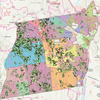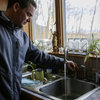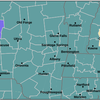Advocates call on state to mitigate toxic sludge used on farmland
ALBANY COUNTY — New York State regulations currently allow for fertilizers to use sewage sludge that may contain a highly toxic class of chemicals known as PFAS, resulting in risks to human health that advocacy groups like the Sierra Club and the Northeast Organic Farming Association of New York are calling on the state’s Department of Environmental Conservation, Department of Health, and legislature to control.
Known as “forever chemicals” because they don’t naturally degrade, per- and polyfluoroalkyl substances, known as PFASs, are a group of over 9,000 manmade chemicals that are used in the production of all sorts of products from fast food packaging to non-stick cookware to clothing to toilet paper, according to a report published this month by the Sierra Club.
Because these chemicals don’t break down well, they can easily accumulate in the environment and build up in the human bloodstream, with the United States Environmental Protection Agency reporting evidence that PFASs can contribute to certain cancers, hormonal imbalances, weakened immune systems, developmental challenges, and more.
One way PFAS infiltrates the human body, the Sierra Club report says, is through fertilizers made from recycled sewage sludge, also known as biosolids, that are then applied to farmland or home gardens.
Although there is growing awareness of the harm PFAS can cause, the Sierra Club points out that the DEC’s draft Solid Waste Management Plan — which is subject to public comment until June 29 — “is projecting a staggering increase in land application of sewage sludge, almost tripling the current amount, in its draft state solid waste management plan released in the spring of 2023.”
The DEC’s projections table shows that 425,585 tons of sewage sludge is expected to be recycled this year — up from just over 300,000 tons in 2018 — and that, by 2050, there will be 782,527 tons, representing a recycling rate increase of 26 percentage points over the next 27 years.
“New York is a national leader in responding to the threats posed by emerging contaminants like PFAS and DEC continues to advance efforts to regulate these contaminants,” a DEC spokesperson told The Enterprise. “When properly treated and processed, biosolids are nutrient-rich organic materials that can be recycled and utilized as a soil amendment in New York State.
“As the science behind PFAS exposure pathways continues to evolve, DEC recognizes the potential for PFAS to re-enter the environment and negatively impact natural resources and public health in the event of the land spreading of biosolids containing excessive levels of PFAS.
“To address this concern, DEC proposed a draft policy (DMM-7) earlier this month to specifically address biosolid use that would include sampling requirements for biosolids recycled in New York State and actions DEC will take based on those results.
“This proposal is available for public comment until July 10, 2023, and DEC encourages New Yorkers to review and provide input for consideration prior to policy finalization. DEC is already examining our authority to begin making changes at existing biosolid recycling facilities to further ensure the protection of public health and the environment.”
The draft solid waste management plan additionally notes several initiatives to address PFAS contamination.
It says that the department is “completing a comprehensive risk assessment to determine an environmentally protective limit for biosolids recycling.”
Also, the DEC is providing funding to the State University of New York College of Environmental Science and Forestry “to determine the concentration of PFAS in recycled biosolids in New York State and to identify any industrial sources so they can be addressed.”
The DEC also plans to “support efforts to require solidification of industrial, commercial, or remedial wastes that contain PFAS compounds prior to disposal in solid waste landfills,” the plan says.
Shortcomings
The Sierra Club report says that EPA testing requirements for biosolids used as fertilizer do not require testing for PFAS, but that their own testing, done in collaboration with The Ecology Center, found that eight out of nine sampled fertilizer products contained PFAS levels that exceeded the threshold set by the state of Maine — a threshold the Sierra Club considers exemplary.
“This testing revealed PFAS concentrations consistently in the tens-to-hundreds of parts per billion,” the report says. “This is magnitudes greater than the drinking water maximum contaminant levels which is set in the very low parts per trillion by various state and federal entities.”
The report notes that Maine and Vermont have each taken steps to mitigate PFAS in solid waste, but that New York State has yet to implement meaningful standards.
“Despite the dangers [of PSAS] however, New York State does not require wastewater treatment plants in the state to test for PFAS and its proposed standards for PFAS in sewage sludge biosolids will not protect human health or the environment,” the report says. “Nor does the state require companies that sell sewage sludge-based compost, soil amendments and fertilizers, whether directly to farmers or in retail outlets like Home Depot and Lowes, to test their products for PFAS.”
Call to action
Specifically, the report calls on New York State to take the following actions:
— “The NYS Legislature should direct the NYS DEC to stop the spreading of sewage sludge in any form on fields and farms, and end the production, sale, and distribution of soil amendment products including ‘compost’ from sewage sludge, due to strong evidence of their widespread contamination with PFAS”;
— “The NYS Legislature should pass the PFAS Surface Water Discharge Disclosure Act requiring testing of wastewater treatment plant effluent for PFAS contamination”;
— “The NYS Legislature should direct the NYS DEC to ban wastewater treatment plants from accepting landfill leachate, unless PFAS contaminants are destroyed or removed beforehand. If filtered, contaminated filters should be treated as hazardous substances and dealt with in such a way that they do not end up in our water, air, soil, or otherwise contaminate the environment or enter the food chain”;
— “New York State’s Climate Scoping Plan, approved by the State’s Climate Action Council in December 2022, dangerously encourages the mixing of food waste with sewage sludge/wastewater biosolids in anaerobic digesters in order to generate methane under controlled conditions. We ask the state to withdraw this policy recommendation so that it does not appear in the final regulations. Mixing food waste — a relatively clean organic feedstock — with sewage sludge/biosolids — which are highly contaminated with PFAS and numerous other unregulated pollutants — will dramatically increase the quantity of organic waste contaminated with PFAS”;
— “NYS Department of Health (DOH) should strengthen its drinking water standards for PFAS, issued in October 2021, to conform with the US Environmental Protection Agency’s proposed federal maximum contaminant levels issued in March 2023. As maximum contaminant levels only cover public drinking water supplies and rural wells are also vulnerable to contamination, the state should develop a testing program for private drinking water wells. The state DEC should similarly strengthen its weak surface water standards to reflect the dangers PFAS pose to aquatic life, groundwater, and humans”;
— “The NYS Legislature should direct the NYS DEC to test for PFAS in soil, water, and agricultural products grown where sewage sludge-based soil amendments are known to have been spread. The state should also conduct free tests for PFAS at the request of farmers, landowners, or tenants, whether of their land or of PFAS in the blood of their family members or workers. It should promptly inform the land owner(s) and, if different, the farmer or tenant, of the test results. It should also provide them and other affected parties with information about PFAS toxicity, potential health effects, persistence, and other relevant characteristics. It should also create a mechanism for private individuals to determine the contamination of land related to a purchase or lease agreement”;
— “The NYS Legislature should direct the NYS DEC to require regular PFAS testing of all sewage sludge and industrial biosolids, such as paper factory sludge. It should inform wastewater treatment plants, farmers using sludge and others of the potential dangers of PFAS in sewage sludge”;
— “The NYS Legislature should direct the NYS DEC to mandate that all reportable PFAS and water data collected by the State be posted online in a readily searchable format and submitted to the US EPA for inclusion in the agency’s ECHO (Enforcement and Compliance History Online) database”;
— “NY State should apply for the maximum amount of support possible from the US EPA’s $4 billion fund to address PFAS and other emerging contaminants in drinking water, along with the EPA’s Small and Disadvantaged Communities Fund”;
— “The NYS Legislature should take bold action to eliminate products and materials containing PFAS from the waste stream as much as possible, starting with an across-the-board ban on the intentional addition of all PFAS compounds in consumer and commercial products. Until that is accomplished, the state should require that content labels for every product sold in NYS disclose if any PFAS were used in the manufacturing process, or intentionally added to the products or their packaging sold in NYS”;
— “The NYS Legislature should establish a compensation fund to support farmers who may lose their livelihood and their ability to farm their agricultural lands when PFAS contamination is found. Further, the state should develop a program to support farms impacted by contamination with expenses related to testing, compensating losses in revenue due to contamination, and assistance in navigating future business plans”; and
— “The NYS Legislature should devise a system where the polluting company is held financially responsible for the harms created by the spreading of sewage sludge.”
NOFA-NY
The Northeast Organic Farmers Association of New York (NOFA-NY) — which is made up of farmers, gardeners, and consumers alike, according to its website — wrote in a statement this week that it “echoes the Sierra Club’s call to immediately take action to keep PFAS out of sewage sludge, away from water, and off our farmland. NOFA-NY calls for the state and federal governments to protect the livelihoods of New York’s farmers.
“As contaminated soil, milk, produce, and crops are detected, farm families and farmworkers are most vulnerable and need immediate state and federal support to protect themselves, their businesses, and their communities against continued exposure,” the statement reads.
“PFAS linger in soil for decades regardless of current farm practices. In Maine, farmers have identified contamination decades after sewage sludge spreading (the main vehicle of soil contamination) ceased. Even farmers who unknowingly purchased contaminated land years ago and never applied sewage sludge have lost their ability to farm on that land due to contamination.”
NOFA-NY Policy Manager Katie Baildon told The Enterprise in an email this week that, while she isn’t aware of any current legislative efforts to address the issue, the group would “certainly welcome the opportunity to work on legislation that would limit exposure and protect farmers and communities from further risks.”
“The biggest obstacle at the moment is continued contamination,” Baildon said. “NY has passed a handful of bills to prohibit manufacturing and sales of certain products containing PFAS but PFAS chemicals themselves are continuing to be manufactured and used in many products.
Low awareness of the problem is also a contributing factor, she added.
“With a better understanding of where sewage sludge has been spread, NY could create a plan for testing and monitoring like the state of Maine is doing and create informed programs to support farms that may be impacted including soil and water testing, health screenings, crisis support, financial and liability relief, and assistance in navigating future business plans,” Baildon said.



